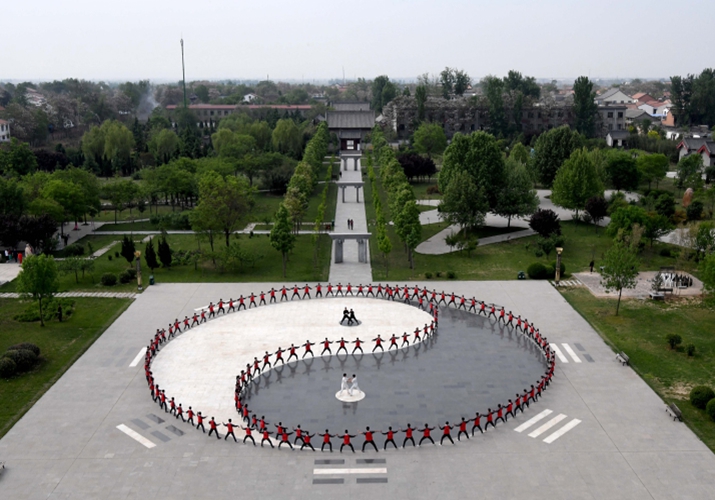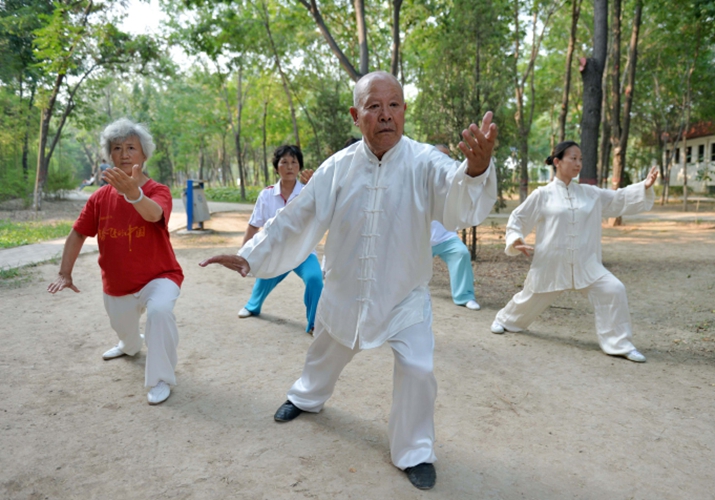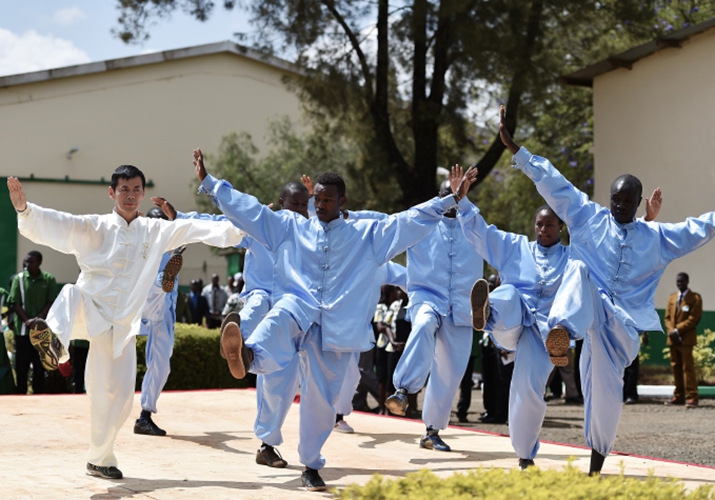|
||||||||||
| Home Nation World Business Opinion Lifestyle ChinAfrica Multimedia Columnists Documents Special Reports |
|
||||||||||
| Home Nation World Business Opinion Lifestyle ChinAfrica Multimedia Columnists Documents Special Reports |
| Current Cover Story |
| Taijiquan, an ancient, elegant Chinese martial art recently listed as a world intangible cultural heritage, is increasingly popular at home and abroad |
| In recent years, Taijiquan, also known as Tai Chi or Chinese boxing, a traditional Chinese martial art, has become a well-known physical exercise worldwide |
| By Xia Yuanyuan VOL. 13 FEBRUARY 2021 ·2021-01-20 |

Dressed in a white silk Taijiquan uniform, 23-year-old Halvin Pierre Junior Bessayi goes through the flowing sequences of the ancient martial art seemingly in a moving meditation.
"It makes me feel harmony with nature and people," he told ChinAfrica.
As a student from Gabon who is studying for his master's degree in diplomacy at China Foreign Affairs University, Bessayi has encountered various aspects of Chinese culture during his time in the country, one of which is Taijiquan.
"Since childhood, I have seen amazing action movies starring Bruce Lee, Jackie Chan and Jet Li, and I was always curious to learn Chinese martial arts," he said. Once he arrived in China in 2017, he chose Taijiquan as an additional course to realize his dream of mastering the techniques of Chinese martial arts.
In recent years, Taijiquan, also known as Tai Chi or Chinese boxing, a traditional Chinese martial art, has become a well-known physical exercise worldwide. On December 17, 2020, it was added to UNESCO's Representative List of the Intangible Cultural Heritage of Humanity.
"I felt proud when I heard the news. Its inclusion [in the UNESCO list] is of great significance to the promotion of wushu (martial arts), and especially Taijiquan, globally," said Bessayi.

Origin of Taijiquan
Taijiquan is a major division of Chinese martial arts. Literally, it means Tai–supreme, ji–ultimate and quan–fist.
There have been different stories about the origin of the martial art. A traditional legend goes that a wise man, Zhang Sanfeng, during the Song Dynasty (960-1279) developed Taijiquan after he had witnessed a fight between a sparrow and a snake.
The other story about its origin goes back to the mid-17th century in Chenjiagou, a village in Wenxian County in central China's Henan Province. It is said that a retired general and village head named Chen Wangting combined his kungfu training with elements of Chinese philosophy to create Chen style Taijiquan. Popular belief holds that many modern styles of Taijiquan have been derived from the Chen style. Wenxian is listed as Taijiquan's birthplace on the UNESCO website.
Apart from the Chen style, the most famous forms of Taijiquan practiced today also include Yang, Wu, Woo and Sun styles. All these five styles have the same origin and share many similarities. However, each style has its own unique characteristics and emphasizes a particular aspect of movement.
Nowadays, when most people talk about Taijiquan, they are usually referring to the Yang style, which has already spread throughout the world and is practiced by millions of people.
Soft but deep strength
Bessayi said Taijiquan is different from what he imagined before he started to practice it.
In his mind, Chinese kungfu is powerful, fast and aggressive, like a tiger, and it is about glamor and razzle-dazzle. However, after his arrival in China and wandering around campus, he saw a number of older people practicing Taijiquan in slow synchronized movements.
"I stopped and watched their movements closely. It fascinated me, and the very next day at registration time, I rushed to the admin office to choose it as my additional course," Bessayi told ChinAfrica.
Taijiquan's basic movements center on wubu (five steps) and bafa (eight techniques) with a series of routines, exercises and tuishou (hand-pushing skills, performed with a counterpart).
Influenced by Taoism, Confucian thought and theories of traditional Chinese medicine, Taijiquan is considered as an internal martial art, utilizing the internal energy, or qi, and following the simple principle of "subduing the vigorous by the soft." The martial art emphasizes the yin and yang cycle (balance of negative and positive) which expresses the continuous flow of energy in a circular motion that generates two opposite forces, plus and minus, which interact and balance with each other to bring existence to the physical and metaphysical world.
Benefits for mental and physical health
In modern society, Taijiquan is popular because people are seeking longevity, stress reduction and improved health through the mind-body exercises.
"Especially in larger cities, people are constantly distracted and stressed. They need to keep calm and relaxed by practicing Taijiquan. This sort of slow-paced lifestyle is good for both mental and physical health," said Chen Sitan, founder and Chairman of the Tai Chi Qigong Association of America (TCQAA), in an interview with Xinhua.
Involving slow movements and deep breaths, Taijiquan has many physical and emotional benefits, which include decrease in anxiety and depression and improvements in cognition. It may also help to manage symptoms of some chronic diseases, such as chronic obstructive pulmonary disease, according to the TCQAA.
In South Africa, Taijiquan has numerous followers as it is believed to boost the immune system, lower blood pressure, relieve stress and improve balance and coordination.
Abdul Kader Baynes, President of the South Africa Taijiquan Authority, said that in the country people are increasingly suffering from diseases such as diabetes, as well as joint pains, especially the youth. "People should learn the wellness exercise [Taijiquan]. Anybody can do it and anybody can benefit from it," he said.
More than a set of martial art skills and kicking and punching, the discipline is a mental process.
For Moussa Paul Korongo, a 28-year-old student from Mali, practicing Taijiquan is a way to integrate the body and mind. "In pursuing the wholeness of the self through Taijiquan, I learned perseverance, forbearance, and focus," he told ChinAfrica.

A door to Chinese culture
For 18-year-old Kenyan Derrick Okuku and dozens of other youths at the Children Garden Home and School in Nairobi, Capital of Kenya, Taijiquan means a chance to learn about the Chinese culture.
Okuku had little knowledge about China before his kungfu teacher Li Hao's visit. In 2018, Li became a volunteer with the TUNZA Africa International Volunteer (TAIV) group, an information platform for Chinese youth to get opportunities to volunteer and internship in Africa. After arriving at the Children Garden Home and School, Li was tasked with designing a course for local students. Having practiced Taijiquan for many years, the 22-year-old young man chose to teach the martial art.
"Taijiquan is a shortcut for local young people to understand Chinese culture. It's not simply a sport, but the Chinese culture, philosophy, and humanitarian ideals are all imprinted in the art," Li told ChinAfrica.
In Tunisia, the martial art also opens doors for people to learn Chinese culture. In the country's capital Tunis, Bedis Zouiten is known as one of the most talented Taijiquan instructors in Africa. He acquired the skills from disciples of influential Chinese masters, and now, for over two decades, Zouiten has been training adepts across Tunisia.
"Taijiquan is an internal martial art. It is a state of mind and a source of power and inspiration. It reflects the beauty of Chinese culture," he told CGTN.
Practitioners come from many regions and social backgrounds. Zouiten believes that he's spreading peace through the martial art. "Any man, woman or child on earth can learn Taijiquan. This discipline gives power and self-confidence. The practioners reject violence because they can control the feeling of anger through the dissipation of negative energy," he said.
Innovative way of promotion
In ancient times, the inheritance of Taijiquan was carried out strictly through transmission from the masters to their disciples. However, today, China has taken measures to promote the martial art.
The Chinese Government and schools work together to improve the popularity of the traditional Chinese martial arts on school campuses. In Xi'an Jiaotong University, Taijiquan is a compulsory class.
Wang Yunbing, Director of Xi'an Jiaotong University's sports center, said, "Taijiquan is not only a sports exercise to help keep fit, but also a tradition embodying ancient philosophical ideas. Moreover, students can practice it with little space."
Taijiquan is also effectively being promoted via the Internet. Ye Yongxiang, the sixth-generation heir to the Yang Style Taijiquan, has started teaching the practice online, in order to share the time-honored martial art with people around the world.
Born in the mid-1980s in Shanghai, Ye first learned about Taijiquan from her mother, a professional martial artist.
Early in 2017, Ye set up her own Taijiquan studio in Shanghai. Tapping into the country's fast-growing online community, she began using video streaming to teach the martial art.
With her precise, accessible language and multi-angle demonstrations, Ye is now known on China's vibrant cyber community as the Taijiquan goddess. Her micro-blogging platform Weibo now has more than 70,000 followers and her online interactions with university lectures have attracted thousands of young people to the ancient martial art.
Through her two decades of learning and teaching Taijiquan, Ye has observed a shift in people's attitude toward the tradition, which used to only be valued as a form of physical exercise.
According to Zhang Shan, former Vice Chairman of Chinese Wushu Association, the number of people practicing Taijiquan in China exceeds 50 million as of March 2019, while more than 150 countries and regions have launched Taijiquan programs. Around the globe, more than 150 million people practice the martial art according to Zhang.
(Print Edition Title: Poetry In Motion)
Comments to xyy@chinafrica.cn
| About Us | Contact Us | Advertise with Us | Subscribe |
| Copyright Beijing Review All rights reserved 京ICP备08005356号-5 京公网安备110102005860号 |